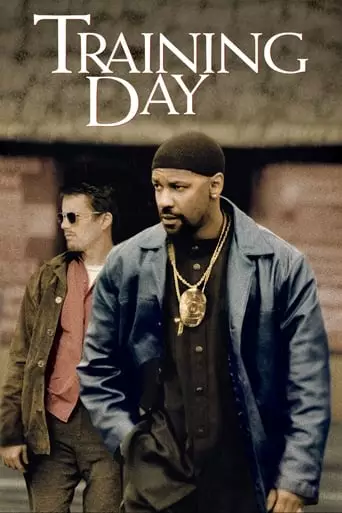On his first day on the job as a narcotics officer, a rookie cop works with a rogue detective who isn’t what he appears.
“Training Day” follows a young and idealistic LAPD officer, Jake Hoyt (Ethan Hawke), who is assigned to a 24-hour training day with Detective Alonzo Harris (Denzel Washington). Harris is a charismatic but morally corrupt narcotics officer known for bending or breaking the law to catch criminals. As the day unfolds, Hoyt is introduced to the dark, seedy underworld of Los Angeles, where the line between right and wrong becomes increasingly blurred.
Initially, Hoyt looks up to Harris, eager to prove himself, but soon discovers the grim realities of Harris’s methods, which include coercion, theft, and even murder. Throughout the day, Hoyt faces tests of his morality, as Harris forces him into compromising situations. The tension builds as Hoyt navigates through this morally ambiguous world, ultimately confronting Harris’s deep corruption and becoming a key player in the power struggle that ensues.
Themes:
- Corruption and Morality: One of the central themes of “Training Day” is the contrast between idealism and corruption. While Hoyt begins the day with a clear moral compass, Harris represents the cynicism of those who justify unethical actions for the greater good. The film examines how power can corrupt, and how even a system designed to enforce justice can be manipulated for personal gain
- The Cost of Ambition: Hoyt’s journey throughout the film is also one of ambition and the pressure it places on his integrity. As Hoyt seeks to rise within the LAPD, he is faced with choices that force him to question how far he is willing to go to achieve his goals. His internal conflict is mirrored by Harris’s unrelenting desire for wealth and power
- Good vs. Evil: While Harris initially appears to be a hero of the streets, his actions reveal the darker side of human nature. The movie challenges traditional notions of good and evil, presenting characters who exist in morally gray areas. It’s not simply a battle of police against criminals, but a deeper exploration of what it means to be a “good” person within a corrupt system
- Trust and Betrayal: Another key theme is trust, particularly in the context of relationships. Hoyt must decide whether to trust Harris or go against him, risking his career and possibly his life. This theme is especially evident in Hoyt’s interactions with other characters, such as the gang members he encounters, where loyalty and betrayal are constant forces at play
10 Reasons to Watch “Training Day”:
- Denzel Washington’s Performance: Washington’s portrayal of Alonzo Harris is electrifying. He won an Academy Award for his role, and his complex, layered performance drives the film’s tension. He expertly balances charm and menace, making Harris one of the most memorable characters in modern cinema
- Ethan Hawke’s Transformation: Watching Hoyt evolve from a naive rookie to a man who must face the harsh realities of the world around him is captivating. Hawke gives a deeply emotional and engaging performance that contrasts perfectly with Washington’s intensity
- Exploration of Corruption: The film provides a gripping exploration of corruption within law enforcement, asking tough questions about morality, loyalty, and justice. It’s a sharp commentary on the imperfections of systems meant to protect society
- Thrilling Action: “Training Day” is filled with pulse-pounding action sequences, from tense confrontations to high-stakes standoffs. The film keeps the viewer on the edge of their seat with its unpredictable and gritty depiction of urban crime
- Moral Dilemmas: The film presents complex moral dilemmas, forcing the viewer to reflect on what they would do in Hoyt’s shoes. This sense of moral ambiguity creates a thought-provoking narrative that stays with you long after the credits roll
- Realistic Depiction of Police Work: The film’s gritty portrayal of life in the LAPD’s narcotics division is immersive and raw. The movie doesn’t shy away from showing the dangerous, morally challenging situations officers face on a daily basis
- Intense Atmosphere: Antoine Fuqua’s direction creates a tense, immersive atmosphere, pulling the audience into the gritty world of Los Angeles streets. The urban environment becomes a character in itself, reflecting the moral decay of the story
- A Bold Ending: The film’s conclusion is both shocking and satisfying, delivering a powerful message about the consequences of corruption. It’s an ending that leaves a lasting impression on the audience
- Engaging Dialogue: “Training Day” features sharp, memorable dialogue that captures the essence of the characters. The back-and-forth between Hoyt and Harris is full of tension and wit, making the film’s conversations just as compelling as its action scenes
- Cultural Impact: Beyond its critical acclaim, “Training Day” became a cultural touchstone, influencing how we perceive police procedurals in film. The film’s gritty portrayal of law enforcement set a new standard for urban thrillers
Emotional Impact After Watching “Training Day”:
After watching “Training Day,” you are likely to feel a mix of intense emotions. The film’s exploration of moral corruption and the betrayal of ideals can be unsettling, leaving you questioning the nature of justice. You might feel a sense of catharsis after Hoyt’s ultimate decision to stand up against Harris, but there will also likely be discomfort due to the film’s bleak portrayal of a corrupt system. The sharp moral dilemmas and the ruthless actions of the characters can leave you reflective, grappling with themes of right and wrong that linger long after the credits roll
In conclusion, “Training Day” is a gripping, thought-provoking thriller that delves deep into the moral complexities of law enforcement. With outstanding performances, especially from Denzel Washington, and a storyline that keeps you questioning what’s right, it’s a film that resonates on multiple levels.

